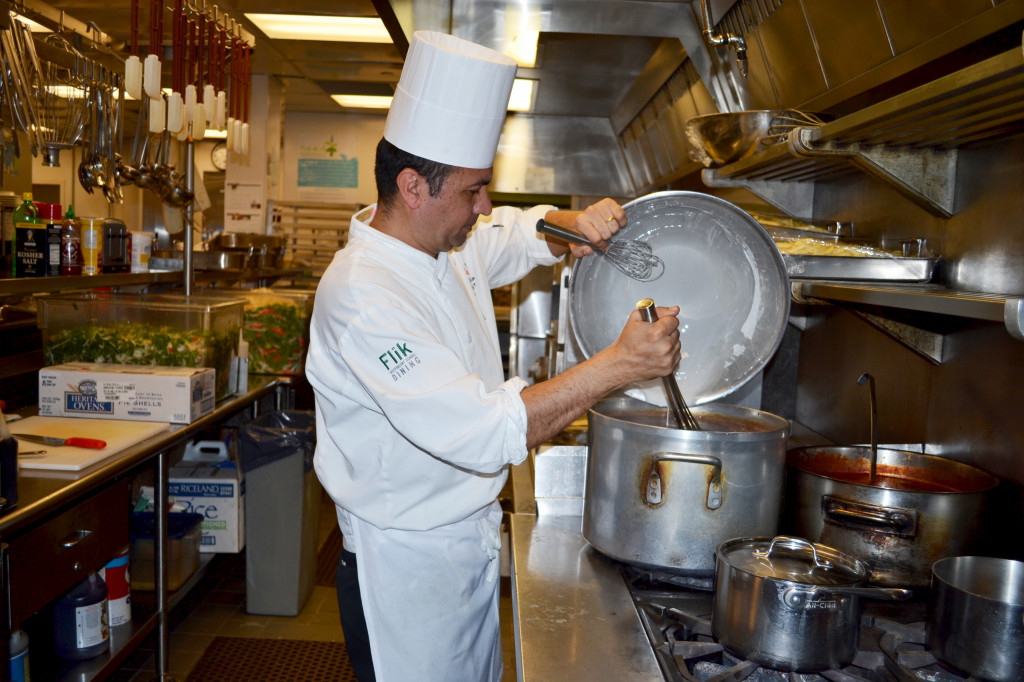
Photo by David Fishman
Between student petitions about the alternate gym credit requirement and polling on whether or not the school should invest in two-ply toilet paper, FSG presidents Adam Chan and Jake May certainly have their work cut out for them. The co-presidents hit a sweet spot this month as they announced the long-anticipated news that tilapia will be taking leave from the Fieldston lunch menu, at least for a little while. This decision is part of a string of trial revisions to the lunch menu, spearheaded by Adam and Jake, and agreed upon by the FLIK staff and our head chefs.
Earlier in the year, Chan and May sent out a lunch menu survey to the student body. The survey, which asked students to vote on their favorite lunches and to share how they felt about tilapia and Pizza Fridays, was met with an overwhelming response. Over 400 students participated. 242 students voted for fajitas as their top lunch choice, followed by macaroni and cheese (205), grilled cheese (146), breakfast for lunch (132), and ziti (109). 95 percent of students voted to change Pizza Fridays to a rotation of their favorite lunches and in an expected landslide, 80 percent voted to eliminate tilapia altogether.
In a recent interview Chan reported on the kitchen’s response to this new student initiative: “We had two meetings with the FLIK staff. In the first meeting we presented our two proposals, and the survey data on them. Mr. Acevedo, the executive chef, and Mr. Spilios, senior director of dining services, were both very nice and receptive to student suggestions. They said they would discuss our proposals with their staff. At our second meeting, they presented us with the December menu, indicating that they had indeed agreed to our proposals generally. The favorite lunch rotation did not happen, but they are including the favorite lunches much more regularly. They told us that we could meet again at the end of December to discuss making these changes permanent.”
While such tangible progress is good news for the student body—and hopefully, will go a long way in keeping students on campus for lunch—the cafeteria’s food selection process is an important consideration that’s often overlooked. Lunch is a hectic time of day with people jostling their way through the lunch line or crowding around the bagel stand to snatch the last mini-bagel. Many of us, caught up in this commotion, don’t take any of the simple steps made available to us to learn about the food Fieldston serves to its community. A scarce few even notice the posters hung up throughout the cafeteria, outlining the nutritional and environmental guidelines for our dining hall. When considering reforms to Fieldston’s lunch menu, it is crucial to consider the ethical commitment our school has toward sustainability and animal treatment. This must be balanced with matters of student preference. Our mission statement doesn’t stop at the cafeteria doors. Rather, our dining hall is the leading space from which we can affect real, positive change.
Fieldston is the first K-12 school in the country to receive 3 stars from the Green Restaurant Association, a national, non-profit organization that assesses restaurants on their sustainability practices. The debate surrounding tilapia has been considered only in terms of student satisfaction. Upon talking to Mr. Spillios, the director of dining services at Fieldston, I learned that there is a deeper motivation for keeping tilapia in the lunch rotation.
“FLIK has partnered with the Monterey Bay Seafood Watch as part of its fish selection process,” said Mr. Spilios. “Many types of fish are actually overfished, so we look to serve fish that will have the least impact on the ocean’s ecosystem. Tilapia is on the ‘Best Choice’ list of the seafood watch and is accessible to our school.”
Because our cafeteria serves students in the thousands, a decision to switch tilapia to a fish that is on the endangered list could have significant environmental consequences.
Additionally, the FLIK company provides nutrition specialists to review menus and consult on nutrition education. While the cafeteria has been tremendously receptive in implementing student suggestions, pricing, healthfulness of food, and faculty opinions, are all perspectives that people like Mr. Spillios, who works for FLIK, have to consider when generating the lunch menu.
“We want to make everybody happy,” said Mr. Spillios. “We want the student body to enjoy lunch at school and not feel like they need to go out every other day. While sustainability is important to us and to the school, we are given a lot of freedom from FLIK to modify the lunch menu to what we hope the students will like. The elimination of meatless Mondays was a recent example of this.”
When removed from the stigma of cafeteria food, the Fieldston dining hall gains the appeal it rightly deserves. It is a restaurant with its foundation in sustainability, serving locally grown food prepared by expert chefs who know the tastes of the Fieldston community. Above all, the staff in the cafeteria care about the student lunch experience and are working dynamically with our FSG presidents to address any issues the community may have. “We will definitely continue to meet with the cafeteria staff over the next few months,” said Chan. “The first thing on the agenda will be to make the changes permanent, which they intimated will happen, as long as there are no major community complaints. We will also be continuing discussions on various other lunch room issues throughout the year.”





